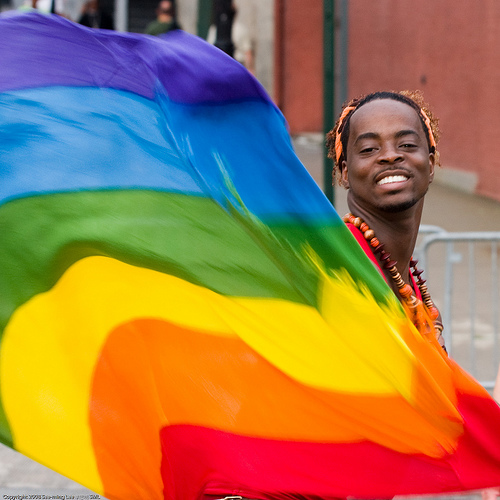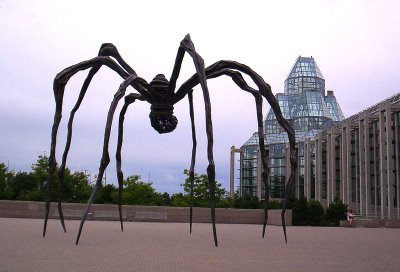Culture & Religion
All Stories
Cleopatra is the selling point but the resurrection of a long-lost world is the strength of a powerful new exhibition at the Franklin Institute in Philadelphia.
“I always said I wasn’t going to write about Norman because no one would believe it,” Norris Church Mailer once said, but now she has written a memoir about her marriage to the novelist.
Exactly one decade ago, on June 2, 2000, President Bill Clinton proclaimed June to be Gay and Lesbian Pride Month in the United States. Last year, President Obama updated the […]
Edmund White is one of the finest writers writing today, and the fact that he is writing a blog for the New York Review of Books—or, moreover, the fact that […]
“A woman has no peace as an artist until she proves over and over that she won’t be eliminated,” Louise Bourgeois once said. On Monday, this plane of existence eliminated […]
P.J. O’Rourke has a clever idea for reviving newspaper sales—the pre-obituary: “official notices that certain people aren’t dead with brief summaries of their lives indicating why we wish they were.”
A new book examines the lives of the Romantic poets in their well-intentioned but ultimately ambiguous morality. It is a case of life imitating art, writes Laura Miller for Slate.
When a college degree no longer guarantees a good job after leaving university, maybe it’s time to be less pragmatic about career choices and prefer a cultural education to a vocational one.
While researching the Botticelli’s Venus and Mars (shown) at the National Gallery, London, David Bellingham, a program director at Sotheby’s Institute of Art, made an interesting discovery. The fruit held […]
“He was almost certainly the best-known man in England in the middle of the nineteenth century, and certainly the most loved,” but was Charles Dicken’s internal life as celebratory?
Generation Y is often mocked for its narcissism and supreme self confidence, but Judith Warner writes that pumped-up egos may be just the thing for weathering our economic storm.
In a recent article in The Australian, Matthew Westwood writes about Canadian social scientist Sarah Thornton, whose book Seven Days in the Art World (cover above) “explores the dynamics of […]
You don’t think much about photography until you have a photography major in the house. And then you find yourself looking at the world around you differently, framing dramatic elements […]
“Today’s college students scored 40 percent lower on a measure of empathy than their elders did,” according to a new study that demonstrates the selfish, competitive nature of the times.
“Art is a conversation between and among artists, not a patent office. Reality can’t be copyrighted,” writes David Shields in his spirited defense of artistic appropriation.
For many people, even those most enlightened when it comes to art and culture, Africa remains “the dark continent” out of which little emerges that sparks interest. The Museum for […]
Called “the hardest exam in the world” by the Telegragh, the entrance test necessary for those keen to spend graduate careers at All Souls, Oxford, included a celebrated element, the […]
Might the Internet serve as a deterrent thanks to its ability to lay bare truths? Vet Patty Khuly comments on a video of the “most horrific scenes bullfighting has ever offered.”
David Jays speculates on why no play was shortlisted for a recent major literary award. Is theater too “brazenly collaborative and transient ” for the literary gatekeepers?
A recent Washington Post article by Jacqueline Trescott and Dan Zak made the bold, but hard to argue with statement that United States museums foil thieves much better than their […]
The relationship between art and society has been deconstructed for what seems like forever. But as the definition of art and performance has broadened over time, some members of society […]
“What Bert Sugar doesn’t know about baseball, nobody knows,” reads a quote from the great Yankees catcher Yogi Berra on the back of Sugar’s new book about the Baseball Hall […]
Urban studies theorist Richard Florida came by the Big Think offices recently to talk about what he’s coined “The Great Reset”—the effects of the economic crisis on our country, and […]
A cache of René Magritte’s personal letters are set to be auctioned soon at Sotheby’s, reports the Economist; the French surrealist was “unremittingly cheery” in his correspondence.
After three men who each believed he was Jesus Christ were made to live together as a psychological experiment, psychologists better understand the nature and limits of identity.
“English has been a language of occupiers and imperialists, but also one of insurgents and democrats,” writes Isaac Chotiner. The New Yorker discusses the new lingua franca.
“The camera is a weapon. The camera can be a machine gun. It can be a psychoanalytical couch. It can be a warm kiss,” opines Henri Cartier-Bresson in The Decisive […]
Three years ago, five-time Grammy-winning singer/songwriter Mary Chapin Carpenter had a pulmonary embolism that threatened her life. She recounts her time in the ER as an incredibly frightening experience, and […]
With the popularity of the Internet and self-publishing, Garrison Keillor laments the end of the glamorous age of publishing from a rooftop in Tribeca.
The Australian anthropologist Sarah Thornton has completed a study of the art world and traced its hierarchies and status-seekers just as she did the London party scene.













